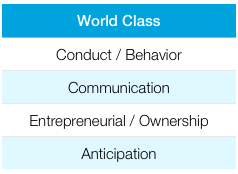
First, I realize the limitations of the phrase “World Class”. It lacks real indexing against standard achievement levels. So, it’s hard to know when you get there. However, the notion of best-in-class performance in a particular business sector, or across business sectors, is something that can be felt by the workforce and realized in earnings. For me, it’s enough to know that each step of improvement from the current state toward some “World Class” ideal means improvement in efficiency, profit, conduct or value.
That’s not to say that it’s merely the embodiment of continuous improvement. I consider “World Class” to be continuous improvement embellished with considerations like transparency, conduct, behavior, entrepreneurial ownership, anticipation, delight and accomplishment.
As an individual, it’s about looking at yourself in the mirror and asking if you are the type of teammate you would want on your team. Instead of living within the limits of your job description, it’s about sincerely asking “what can I do?” to help move the project or the enterprise closer to the objectives. We know this type of enterprise when we encounter it as a consumer. People that love Disney, The Ritz Carlton or Apple Stores pay a hefty price because they are delighted with the products and service and they pay a premium for their perception of “World Class”.
Having said that, some argue that it’s a nebulous endeavor to attempt to define “World Class”. Don’t let that deter you from starting your journey. You might not know the destination, but you certainly should know the direction. Some thoughts that I’ve used in past turnarounds to get alignment from the teams include:
- You need to own the result instead of the activity.
- How are you perceived by your peers? Are you isolating yourself in your silo or do you subordinate the metrics of your functional group to those of the enterprise?
- Do you try to run your career by email or do you engage in organic interaction of carbon-based life-forms (i.e. two people talking)?
- Are you answering the right question or are you just trying to get off the hook?
- Do you work on anticipation and prevention, even beyond your job description, or do you focus on reactions to crises?
- Do you strive to not ship bad parts or drive the team to make it impossible to make bad parts?
- Are you vulnerable?
- Is the workforce passionate about the objectives and their contribution toward them?
- Do you “go to Genba”? You have to go to where the problem is to see it with your own eyes to be sure you are prescribing an effective corrective action.
- Do you attempt to demonstrate your strategic value or are you administrative?
- Do you have relationships with all functional groups at appropriate levels?
- As a leader, do you exhibit an uplifting and positive attitude?
- Are you satisfied with “best practices” or do you believe there are “next practices” that will take your job, your department or your company to the next level of performance?
- Do you appropriately separate important from urgent and manage them accordingly?
- Are you making decisions for long-term prosperity or you chasing myopic goals for short-term “results” at the expense of the future?
- Do you stick to credible plans are you committing to miracles?
- Does the organization recognize where the required talent is not in place and take appropriate action to fill the gaps?
- Does you empower your people with the authority to match their accountability?
You and your team will be performing well when you are in a well matured “Get Organized” phase of a turnaround. You might be performing near the top of your business sector. That’s the good news, considering where you started. The bad news is that now you are probably an “also ran” bunched in with the rest of the good performers. How do you differentiate yourself? It takes courage to blow up the status quo and challenge your team to improve.
It also takes an uncommon understanding of what the difference is between the 98th percentile performance and the 99th percentile. It won’t be the same epic improvements that you made when you were just trying to “suck less” during the “Survival/Containment” phase of your turnaround. It is respect for the value that superlative conduct and behavior bring to an organization. It’s understanding that anticipation and a sense of entrepreneurial ownership at all levels of the company are what makes the difference between those that are on top and those that are following. Second place might be relevant for awhile and might even be profitable. A “World Class” organization thinks of second place as the first loser.


 RSS Feed
RSS Feed
